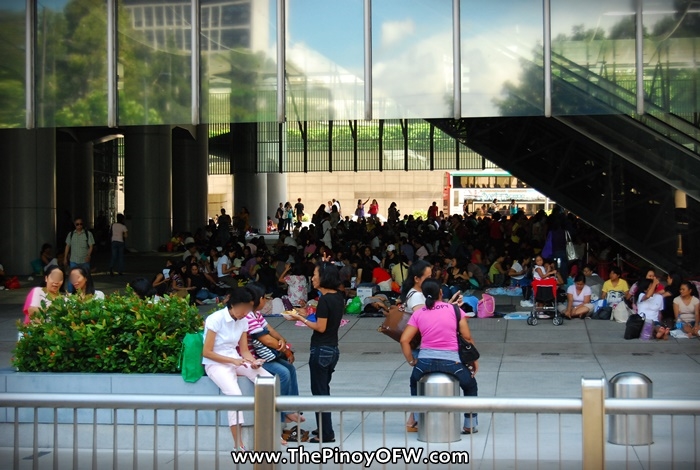Overseas Filipino Workers, or more popularly known as OFWs, have a unique and interesting story to tell. They are scattered all over the world, coming from all walks of life and backgrounds, but they share one common experience: the desire to provide a better life for their families back home.
Also Read: 13 Best OFW Loans in the Philippines (Banks and Government Agencies)
The journey of an OFW is not an easy one. They leave their loved ones behind in pursuit of greener pastures, often facing challenges and hardships along the way. But they continue to persevere because they know that their sacrifices will ultimately lead to a better future for their families.

OFW Population in the World
Today, there are more than 10 million OFWs around the world, contributing to the economies of their host countries and sending billions of dollars in remittances back home to the Philippines. They are a vital part of the Filipino diaspora, and their story is one of hope, determination, and resilience.
Despite the challenges, OFWs continue to choose to work abroad because they believe that it is the best way to provide for their families. They are our modern-day heroes, and we are grateful for their contributions to our country.
What is an OFW?
An OFW is a Filipino citizen who works outside of the Philippines, in another country. They typically work in jobs that are considered to be low-skilled or semi-skilled, such as domestic work, construction work, or factory work.
Nowadays though, there are overseas Filipino migrant workers who also work as professionals, such as nurses, doctors, or engineers.
What does OFW stand for?
OFW stands for Overseas Filipino Worker.
Why Do OFWs Work Abroad?
There are many reasons why Filipinos choose to work abroad. For some, it is simply because they are unable to find jobs in the Philippines that can provide them with the same level of income. Others may be motivated by the desire to gain new experiences or learn new skills. And for many, the primary motivation is to provide financial support for their families back home.
Whatever the reason may be, there is no doubt that OFWs play a vital role in the Philippine economy. They contribute billions of dollars in remittances every year, which helps to boost economic growth and reduce poverty levels in the country.
What are the benefits of being an OFW?
There are many benefits that come with being an OFW. First and foremost, their new environment. Most OFWs are able to earn a higher income than they would be able to in the Philippines. This allows them to provide a better standard of living for their families back home.
OFWs gain valuable work experience that they can use to improve their skills and qualifications.
Where do OFWs Work?
OFWs are migrant workers who are employed in other countries. The top countries where Filipinos work are Saudi Arabia, United Arab Emirates, United States, Qatar, Hong Kong, Singapore, Australia, New Zealand, Bahrain, and Kuwait. Check out more details in this post here – Top 10 Countries with the Most Number of Jobs for OFWs

What are the challenges of being an OFW?
Although there are many benefits to being an OFW, there are also challenges that come with the job. First and foremost, OFWs are often away from their families for long periods of time which can lead to mild to severe cases of homesickness and can be difficult emotionally. They may face language barriers or culture shock in their new environment.
Also, OFWs may also face discrimination or exploitation from their employers. Despite these challenges, OFWs continue to choose to work abroad because they believe that the benefits outweigh the challenges.
What does the future hold for OFWs?
The future looks bright for OFWs. The Philippine government is working to improve the conditions of migrant workers and provide them with more support.
Aside from this, there are many organizations and initiatives that help OFWs adjust to their new environment and provide them with support.
More and more Filipinos are choosing to study or train in professions that are in demand overseas, which will help them find better-paying jobs in the future. Ultimately, the goal is to provide OFWs with more options and opportunities so that they can choose what is best for them and their families.
What does it mean to be an OFW?
Being an OFW means being part of a global community of Filipinos who have chosen to work abroad in order to provide for their families. It is a difficult and often challenging lifestyle, but one that comes with many rewards. OFWs are modern-day heroes, and we are grateful for their contributions to our country.
How can I become an OFW?
There are many ways to become an OFW. The most common way is to find a job in another country that is willing to sponsor your work visa. But you have to go through the legal process in the Philippines. This is by going to POEA-accredited job agencies that will help facilitate your application and work permit before leaving the country.
Finally, you can also choose to study or train in a profession that is in demand overseas. This will give you the skills and qualifications you need to find a good-paying job in another country.
Whatever your reason may be for wanting to become an OFW, there are many options and opportunities available.
How much money do OFWs send home to the Philippines?
In 2018, OFWs remitted a total of $33.4 billion to the Philippines. This is equivalent to around 4% of the country’s GDP. The average OFW sends around $200 per month to their families back home. However, this varies depending on the country they are working in and their income.
What is the Filipino diaspora?
The Filipino diaspora refers to the global community of Filipinos who have migrated to other countries. This includes both documented and undocumented migrants. As of 2017, there were around 10 million Filipinos living overseas.
The majority of them are working as migrant workers or OFWs. The Filipino diaspora is a significant contributor to the Philippine economy, with OFWs remitting billions of dollars every year.
The diaspora provides valuable skills and knowledge that can be used to improve the country’s development.
What is the story of an OFW?
The story of an OFW is one of courage, strength, and resilience. It is a story of leaving everything behind in order to provide for one’s family. It is a story of sacrifices and challenges, but also of hope and determination.
Every OFW has their own unique story, but they all share the same goal of making a better life for themselves and their loved ones. Thank you for being part of the Filipino diaspora and for everything that you do for our country.
What are the contributions of OFWs to the Philippines?
OFWs play a vital role in the Philippine economy. They are one of the country’s main sources of foreign currency, with billions of dollars being remitted every year. They provide valuable skills and knowledge that can be used to improve the country’s development.
OFWs are also an important part of the Filipino diaspora. They help connect the Philippines to the rest of the world and contribute to the country’s globalization. Thank you for your contributions to our country.
How can I support OFWs?
There are many ways to support OFWs. One way is to spread awareness about their situation and the challenges they face. Another way is to provide financial assistance or donate to organizations that help OFWs. Additionally, you can also volunteer your time and skills to help OFWs in your community.
If you’re interested in learning more about the OFW experience, we encourage you to read our other articles on the subject.
Video: OFW Meaning Defined for Non Filipinos
If your are a non-Filipino and you want to know what the meaning of OFW is, you can check out this video below which features a quick explanation of this particular question
Summary
Thank you for your interest in the contributions of OFWs to the Philippines. We hope that this article has helped you understand their story and the challenges they face and what is the meaning of being an OFW.
There are many ways to support OFWs, and we encourage you to do what you can to help them. If you want to learn more about the experience of being an OFW, we recommend reading our other articles on the subject.